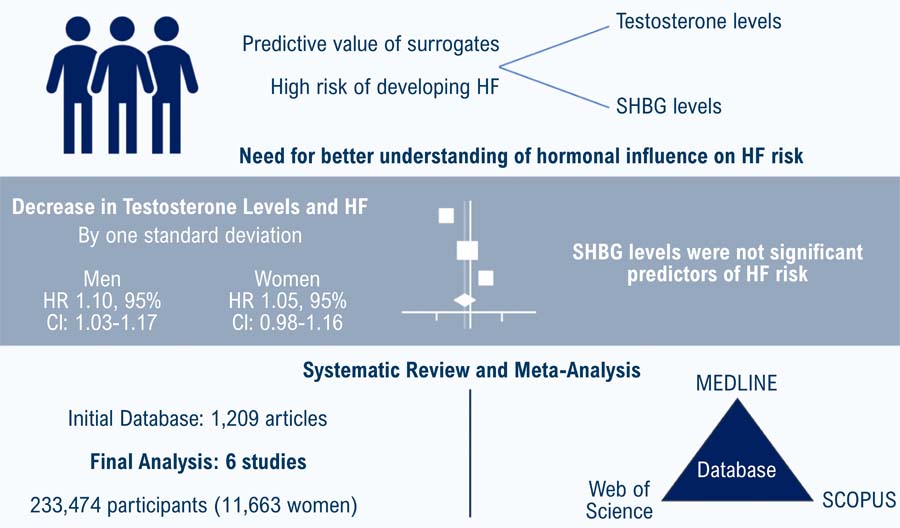Arq. Bras. Cardiol. 2025; 112(10): e20250244
Impact of Low Testosterone and SHBG Levels on Heart Failure Risk: A Systematic Review and Meta-Analysis
Abstract
Background
Studies suggest a possible link between low levels of testosterone and sex hormone binding globulin (SHBG) and adverse cardiovascular outcomes; however, this relationship remains poorly defined.
Objectives
This systematic review aimed to evaluate the predictive value of baseline levels of testosterone, dihydrotestosterone (DHT), and SHBG for the incidence of heart failure (HF), providing deeper insight into the hormonal influence on HF risk.
Methods
We conducted a comprehensive search of the MEDLINE, Scopus, and Web of Science databases to identify cohort and nested case-control studies that measured hormone levels in adults without prior HF. Risk of bias was assessed using the ROBINS-E tool. Pooled hazard ratios (HRs) and odds ratios (ORs) were estimated using bivariate random-effects models. A statistical significance level of 0.05 was applied to all analyses.
Results
Out of 1,209 articles screened, 738 remained after deduplication. Six studies, including 233,474 participants (11,663 women), met the inclusion criteria. A one standard deviation decrease in testosterone levels was modestly associated with an increased risk of HF in men (HR 1.10, 95% CI: 1.03-1.17), but not in women (HR 1.05, 95% CI: 0.98-1.16). Comparisons across quartiles or quintiles did not reveal significant associations, and SHBG levels were not significant predictors of HF risk. Bayesian analysis provided weak evidence for the association (Bayes factor = 0.99).
Conclusions
This meta-analysis suggests that low testosterone levels are modestly associated with an increased risk of HF in men, highlighting a potentially important yet underexplored aspect of cardiovascular health. The heterogeneity in study designs and population characteristics, combined with the weak associations observed, underscores the need for further rigorous investigation. Well-designed randomized controlled trials are essential to confirm these findings and to elucidate the underlying biological mechanisms.
Keywords: Biomarkers; Gender Identify; Heart failure; Risk Factors; Testosterone
17

